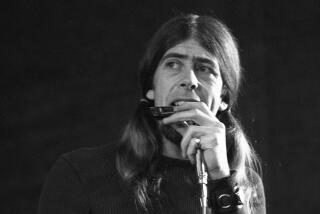SOME NOTES FROM A MAGICAL SAX MAN
- Share via
Tenor saxophonist Johnny Griffin talks the way he plays--vibrant, vigorous and thought-provoking. The 59-year-old mainstream jazz master credits this suppleness of mind and spirit to his occupation.
“Playing music keeps you like that,” he said. “It’s like magic. Even if I’m tired or whatever, once I hit that bandstand and start playing, that’s it. It’s regenerative. Being able to express yourself musically, you’re like a magician.”
Or a storyteller, relating the events of a life. “The music we play is an expression of the sum total of the experiences that we’ve had up until the time we play,” he said.
Griffin, whose quartet plays at Catalina’s Bar & Grill tonight and Saturday, is one to look for life’s upbeats.
“I enjoy life, man,” he said. “I feel fortunate that I’m usually around nice, positive-thinking people. I can’t imagine being around a bunch of grumpy cats, fussin’ and fightin’. My band--we’re all friends, like a big family up there on stage, havin’ fun. I think that lightens the burden of some of the situations that you find (in life), and helps people who listen in some way.”
Though Griffin has been playing sizzling versions of popular standards, originals and jazz classics for more than four decades, he finds this only slightly varying repertoire of swing-era and bebop-based material an unending resource.
“This music is as fresh today as it was before,” he said. “There’s that kind of magnetism in this music. It’s involved, not just intellectually, but emotionally also. And with its advanced rhythms, harmonies and melodic lines, this music lives.
“Besides, I wake up every day fresh and every day I have new experiences so I can express myself, even if it’s the same worked-on material. Strange tunes don’t change that. You just express how you feel.”
Griffin has been an European expatriate since 1963, living first in Paris, then in the Netherlands, near Rotterdam, and now in the South of France. One of the reason he first left the States was a lack of interest in jazz here, a condition he sees slowly changing.
“People are waking up to jazz more now, especially in the last two years,” he said. “For a long time, there were very few clubs, and now they’re popping up again. And young people are becoming interested in Charlie Parker’s and Dizzy Gillespie’s music, the music of the ‘40s and ‘50s. That’s where all the meat is, in that style from late swing era to bebop.”
Newer forms--from free-jazz to contemporary--don’t interest Griffin. “In the ‘60s, you had modal where these guys were playing one chord, but that’s playing one color when there’s a rainbow to chose from,” he said. “And the avant-garde, or free-jazz, a lot of those cats couldn’t play the music, so they turned left. And anytime you have a rock beat, I don’t consider that jazz music. To me, the foundation of jazz music is the rhythm, anyway. The basis of it is that swing and you can’t swing with a rock beat, because it’s stiff, it lacks the flow that makes jazz jazz .”
Griffin began studying the tenor saxophone at age 12. Three days after his high school graduation, he joined Lionel Hampton, and later played with Art Blakey and Thelonious Monk, before becoming a band leader.
Monk remains Griffin’s main inspiration. “I admired him more than any other musician,” he said. “His music is set on another level, as is Billy Strayhorn’s and Duke Ellington’s. Monk was not a bebopper. . . . He was himself. He was also a great humorist. There’d be a room full of cats, and he might not say anything for an hour and everyone’s running their mouths and he’d say two or three words and break up the whole conversation. That was Thelonious.”
More to Read
The biggest entertainment stories
Get our big stories about Hollywood, film, television, music, arts, culture and more right in your inbox as soon as they publish.
You may occasionally receive promotional content from the Los Angeles Times.










